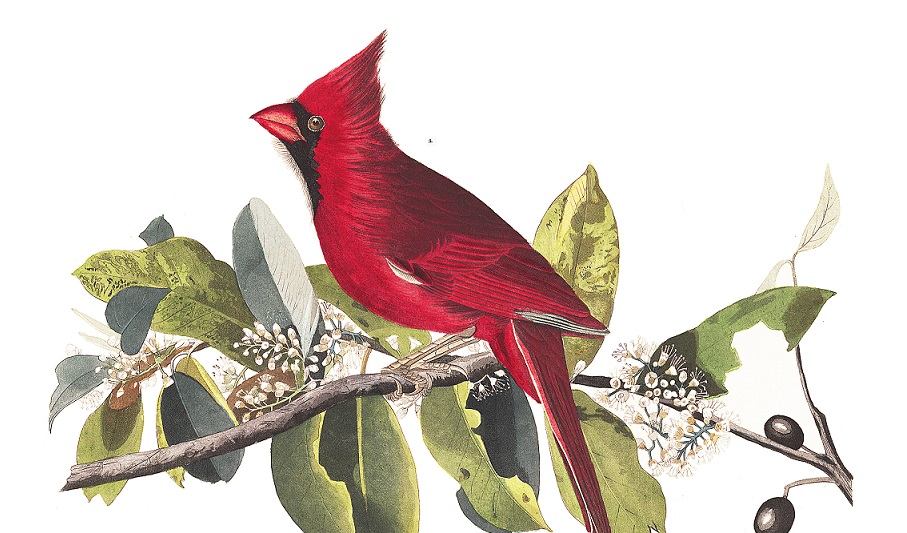.
I wonder where my father’s cardinal is—
The colored-pencil drawing that he made
In art class—he was only in fourth grade,
I’d been impressed to learn.
_____________________It was not his
Idea to frame and hang it up, because
His fear of pride was inbred intuition.
“Mom likes it.” He’d wave off my admiration.
It’s very good; he doesn’t say it’s not;
Reluctantly he tells me, when I question,
That he’d not drawn since school; implied he thought
That art is something we can do without;
Time spent on it is rarely sensible
When there are bills to pay, more practical
Things to be done; it’s merely a distraction—
Legitimate, perhaps, for relaxation,
But scarcely meant to be a true pursuit.
He used his gift in other ways, no doubt,
Pursuing projects much more functional.
With nimble fingers, twenty-twenty vision,
And self-taught skills (no need for inspiration),
He’d fix a broken vase, or paint a wall,
Sew sleeping-bags to take on our vacation,
Or build a spice rack.
________________One year he spent all
His spare time with a pencil and a ruler
To mark where nails would go, then put up walls
That, by the end of summer, lined the halls
Of our new second floor. With saw and hammer
And noisier, more mystifying tools,
He crafted, in a sawdust-clouded clamor,
Two bedrooms—one for me, one for my sister.
He saw it not as art—just made a nest where
We girls spent pleasant years. He, the pragmatic,
Made light of all our praise, and was emphatic
That all he’d done was follow well-made blueprints;
His talent was a matter of indifference
To him, compared with practical precision
And finishing the job; he never thought
Of beauty for its own sake—never got
Past seeing each project just as an equation
With factors, operation sign, solution.
He had no zone of artist’s second sight
(He would have been embarrassed by it.) Quite
Oblivious to any sort of muse,
He made the kind of art that people use,
Unconscious of his gift—
__________________as is the red
And graceful bird that builds a nest instead
Of perching where admirers can see
His brilliance—heedless of humility
Or pride, of being beautiful or useful.
I wonder what became of father’s cardinal.
.
.
Cynthia Erlandson is a poet and fitness professional living in Royal Oak, Michigan. She has had poems published in First Things, Modern Age, Measure Journal, Anglican Theological Review, The North American Anglican, Forward in Christ, and the Anthologies The Slumbering Host (ed. Clinton Collister), and A Widening Light, (ed. Luci Shaw)















Wonderful, Cynthia! I’m particularly glad you didn’t go down the maudlin route, thereby making the poem one of celebration and mild regret.
Thank you, Paul! I think I have very sensitive antennae for anything “maudlin”, in poetry and elsewhere. It’s one of my definite no-no’s. (It’s also why I have a hard time finding acceptable greeting cards, and sometimes just make my own.)
Very beautiful, Cynthia and boy, does it strike a chord!
Thank you, Joe. I’m glad it struck a chord with you.
Cynthia, my parents generation were the ones who went through a war a then just carried on making the world a better place for we baby-boomers. Poetry and art were left to be discovered in lofts, or old handbags prior to funerals. Your poem conveys imagery to which we can all identify. As a long deceased saxophonist friend of mine once said, “If I hadn’t been a musician, I could have done something useful” Thank you for a lovely read.
Thank you very much, Jeff. I like the imagery in your comment, as well, about lofts and old handbags.
Mr. Eardley,
You remind me of a rhetorical question put by the flutist for the San Francisco Street Orchestra as the East Bay contingent speed across the Bay Bridge to set up for one of its weekly noon concerts (on the warm days of the early ’70s): “Why are we doing this?” His answer: “We’re all too chicken to drive buses.”
Sped, of course. When will I get around to that blind typing course?
Mr Woodruff, speed was ok, but should it be “flautist?” A lovely image of that great city which must have looked a lot different in those days.
Flutist and flautist are equally acceptable, although the former is more commonly used (at least in Britain); and ‘speed’ was not “ok” in that context. ‘he speeds’ or ‘he sped’ . . but not ‘he speed’.
To the extent he was either, this guy, with his scraggly beard, thinning hair tied back in a ponytail, and driving his beater of a VW van, was definitely a flutist, not a flautist.
Cynthia, I love this. The words flow smoothly and beautifully and the sentiment is heart-touchingly lovely. Although written in blank verse, the musicality of the poem doesn’t go unnoticed -I simply adore; “He crafted, in a sawdust-clouded clamor” ~ you can see and hear and smell your father’s creativity in this one alliterative line… and I adore the smell of sawdust. My father was very good at carpentry. He made us a summer house and made my pet guinea pigs cages and runs, and I loved kicking through the fresh sawdust in my winter boots.
I also like the way you liken your father’s hidden wonder to that of the modest cardinal’s in the closing stanza… a beautiful read, indeed.
Thank you so much, Susan! I’m very glad you liked it, and could identify with it through experiences you can recall with your father.
Hi Cynthia, I see you became the artist in portraying your father in this lovely poem.
Thank you so much, Norma! You are right that it is a portrait; and, since I can’t paint or draw, I’m glad poetry offers us another way to make portraits.
Yes it is art that makes life immortal.